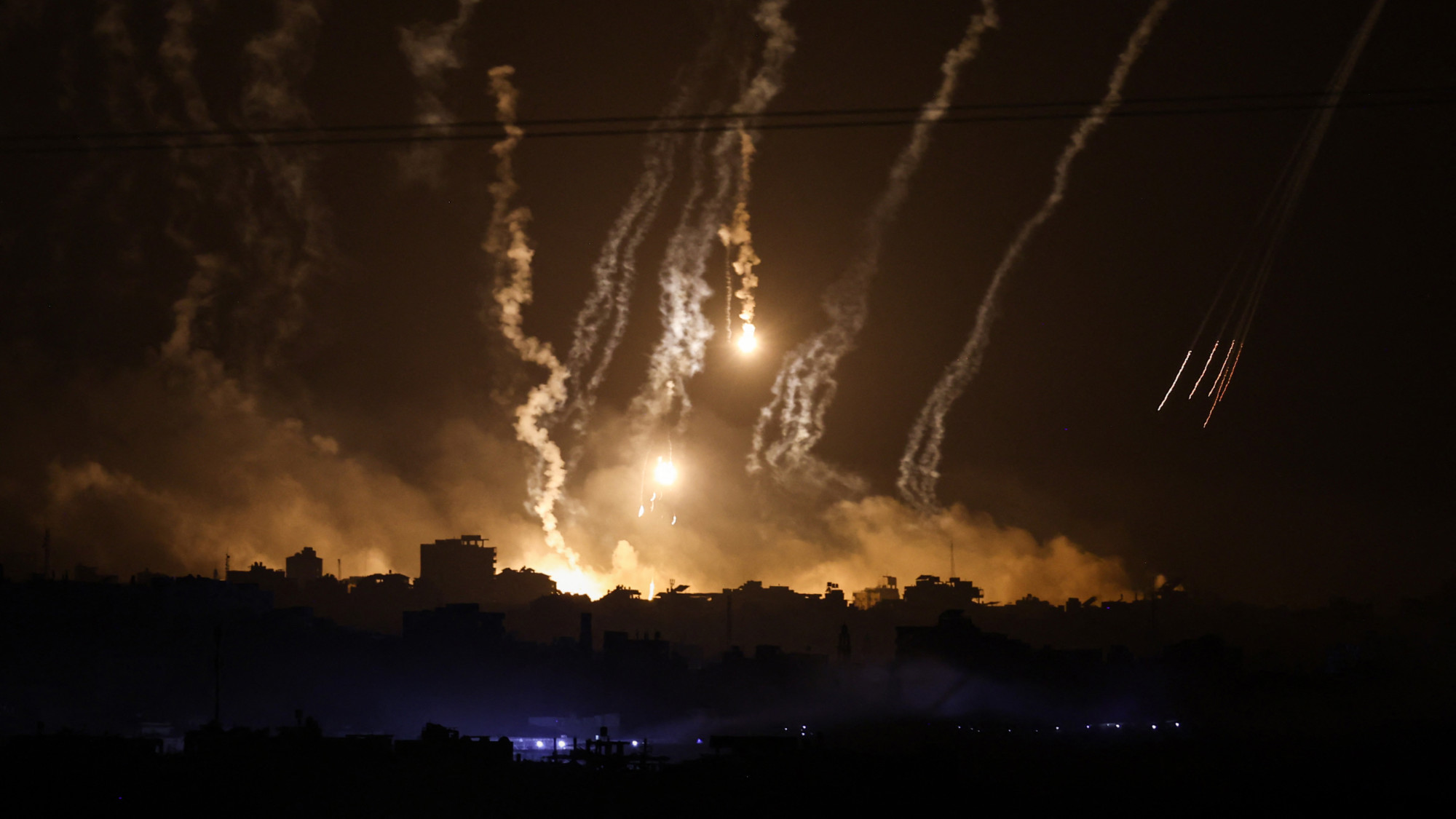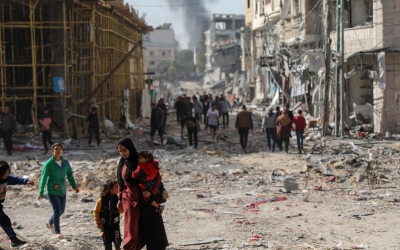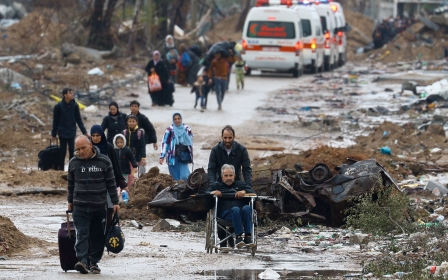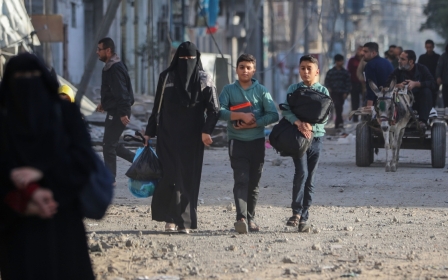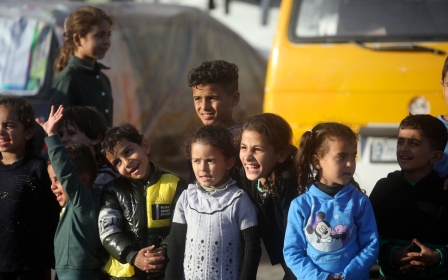Israel-Palestine war: Separated Palestinians use truce to reunite with loved ones
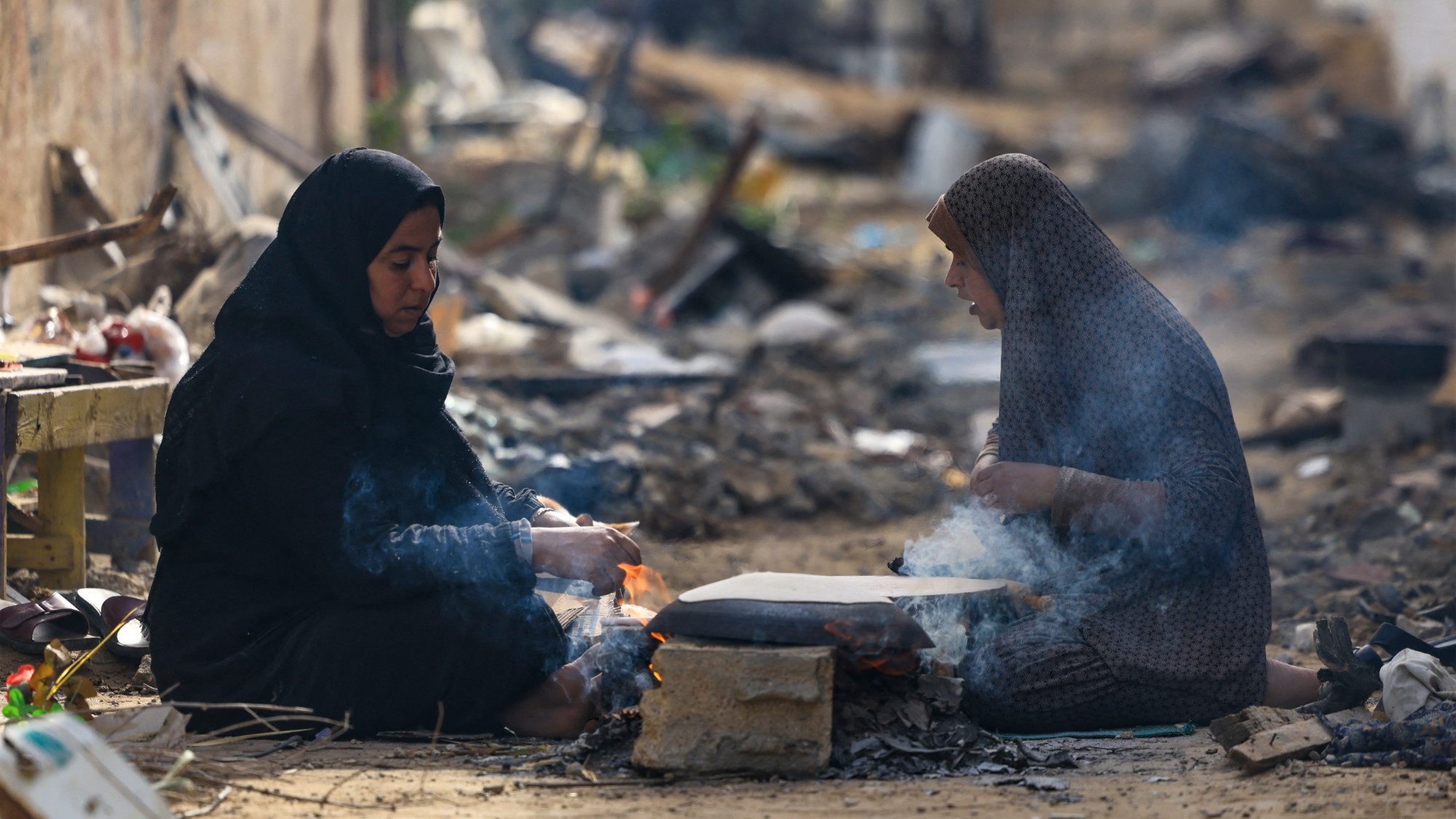
Hugs and tears.
This was the scene when Iman Abuhassira was finally able to see her family for the first time in nearly a month, as a temporary pause in fighting prevailed in the Gaza Strip.
"I did not think I would see them again," Abuhassira said, referring to her father, mother and four siblings.
The Palestinian resident of Gaza City's al-Nasr neighbourhood lives minutes away from her parent's house in the Sheikh Radwan neighbourhood.
New MEE newsletter: Jerusalem Dispatch
Sign up to get the latest insights and analysis on Israel-Palestine, alongside Turkey Unpacked and other MEE newsletters
But following constant Israeli shelling and intermittent communication blackouts, she was separated from them in the third week of the Israeli assault that started on 7 October.
So when the temporary truce between Palestinian groups and Israel took hold on Friday morning, she had only one destination in mind.
"I took my children and went to sleep over at my family's home," Abuhassira, 28, told Middle East Eye.
"My husband went to visit his family, also for the first time in around a month. I slept at my family's home for two days, then joined my husband."
Her story is shared by many Palestinians across the Gaza Strip.
'I couldn't imagine what would happen to me if they were killed without me knowing or being around them'
- Iman Abuhassira, Gaza resident
Israel's siege, ground invasion and bombardment campaign for nearly 50 days had turned life upside down for the 2.1 million people living in the small Palestinian enclave.
The shelling killed at least 15,000 civilians, wounded over 36,000 others and displaced nearly 1.7 million people. Entry of commercial goods and aid was almost completely barred. Movement between various areas was restricted by invading Israeli troops. Electricity and communications were repeatedly shut down.
Amid these suffocating conditions, many lost contact with their loved ones because of lack of transport and communication.
A temporary truce was agreed on Friday, allowing Palestinians a brief moment of respite and a chance to reunite with their loved ones.
The deal, initially valid for four days but later extended until Thursday, put an end to hostilities, allowing the entry of an increased number of aid trucks into Gaza and facilitating the exchange of prisoners between Israel and Hamas.
The Palestinian group has held around 240 people in Gaza since it launched a surprise attack into southern Israel on 7 October, which killed an estimated 1,200 people.
'Terrifying hours'
In the early days of Israel's bombing campaign, Abuhassira was still able to visit her family despite all the risks involved.
"I left my children with their father at home because I was aware I could get martyred at any given moment on my way there," she told MEE, adding that she was able to make the trip three times in the first three weeks.
But after the fourth week, she said, the risk was too high.
"The bombing was insane and the [Israeli] occupation [forces] had begun advancing towards several neighbourhoods."
Abuhassira's worries were compounded by her father, a cancer patient who relies on her support.
A telecommunication blackout imposed by Israel on 27 October, at the start of the army's ground operations, made matters much worse.
As Israel bombs rained in some of the heaviest air raids, Abuhassira could not call, text or see her family for three days as Gaza fell into a complete blackout.
"These were the most terrifying hours," she recalled.
"I did not know if my parents and siblings were still alive or martyred.
"I couldn't imagine what would happen to me if they were killed without me knowing or being around them."
The blackout, which lasted for around 36 hours, left the coastal enclave in total chaos as residents and victims' families were unable to call or reach the civil defence and ambulances.
But even after the blackout, network connections remained weak across Gaza, hampering Abuhassira's attempts to call her family. And with no end to the offensive on the horizon, her fears have not gone away.
"Now that the truce is coming to an end, I do not know when I will see them again," she said.
'I did not see my mother once'
At the start of the offensive, the Israeli army ordered residents of Gaza City and the northern Gaza Strip to forcibly move southward, while also bombing people in those areas designated as "safe".
Thinking the designation could mean at least relative safety compared to the north, Huda Ghalayeeni left her home on 13 October with her husband and four children and found shelter in the Zawaida area in the central Gaza Strip.
Her parents and siblings sought refuge at a relative's house in Khan Younis in the southern Gaza Strip, some 13kms away.
'I call my brother almost every day, but I cannot see him even during the truce'
- Huda Ghalayeeni, Gaza resident
Despite their proximity and being in the "safe" south, Ghalayeeni told MEE she could not once visit her parents.
"When we came here, we thought that the Israeli occupation would be only targeting places in Gaza City and that is why they asked us to evacuate here. But this is not true, most of the neighbourhoods here were targeted and we do not feel safe at all. That is why I could not visit my family all these days," Ghalayeeni explained.
She could only move to nearby areas to buy essential food items and winter clothes, but couldn't risk going any farther.
"My father came to see me around three times, but he only passed by and stayed in the car in front of the house [of refuge]. He only stayed for a couple of minutes and returned as he was afraid he would not be able to return to my mother and siblings."
On the second day of the truce, Ghalayeeni finally felt safe to visit her family. but she could not "get enough of them", as the visit was brief and the prospect of another one is not certain.
"For all those days, I did not see my mother once. Who would believe that I, the one who visits her parents every couple of days, would not be able to see them for around 50 days?" she asked.
"I do not know what I will do now after the truce comes to an end. If I will spend another 50 days without seeing them, I will go crazy."
Although Ghalyeeni managed to visit her parents, she still cannot see her brother and his wife and children.
Like hundreds of thousands of people in Gaza City, Ghalyeeni's brother refused to comply with Israeli orders to leave the north. Residents of the densely populated city said there were no shelters in the south and no guarantee of safety and return.
On the first day of the truce, Israeli forces dropped leaflets on the residents of the southern areas, warning them of returning to Gaza City or the northern Gaza Strip, and threatening they would be targeted if they tried to return.
"The war is not over yet," the leaflet read.
Thus, the displaced families and individuals who left their homes and are currently staying in the central and southern areas of the Strip still cannot return to their neighbourhoods or inspect the damage in their homes.
"I call my brother almost every day, but I cannot see him even during the truce. He refuses to leave his home, fearing that he would not be ever able to return," Ghalyeeni explained.
"So I think I will not be able to see him until the war is over and we are allowed to return to our homes."
Middle East Eye delivers independent and unrivalled coverage and analysis of the Middle East, North Africa and beyond. To learn more about republishing this content and the associated fees, please fill out this form. More about MEE can be found here.


